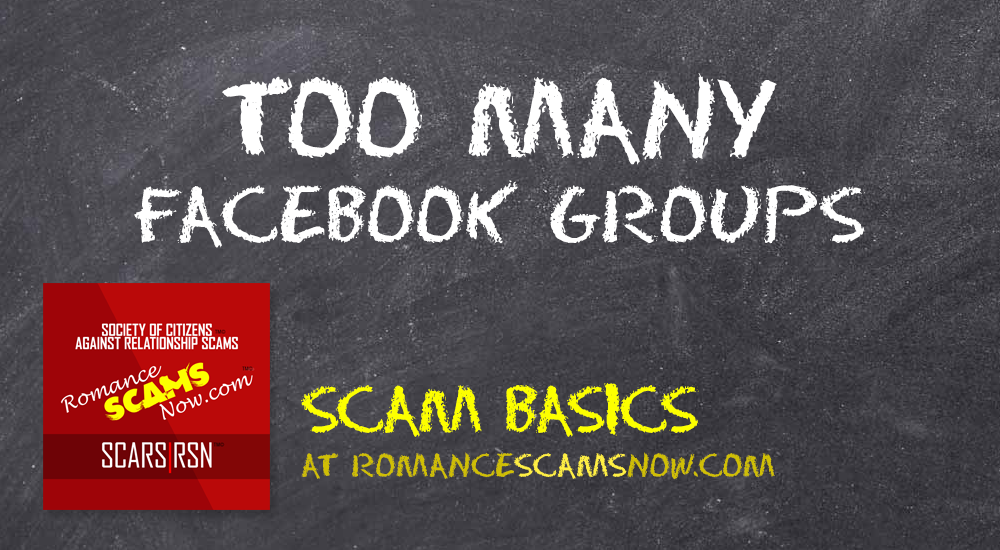SCARS™ Scam Basics: Too Many Facebook Groups
All Scam Victims Have Asked Themselves How And Why They Were Targeted! Did You Ever Think It Was The Groups You Joined?
[lwptoc]
Facebook is a wonderous platform connecting half of the world – at least if you believe Facebook.
The Reality Though Is Quite Different.
At least half of all Facebook profiles are fake or fraudulent. Just imagine that, over one billion fake profiles! (See here »)
The staggering truth is that almost everyone that will contact you online – that you do not personally know is going to be a fake – is going to be a scammer!
But Let’s Talk About Groups And Scam Victim Behavior
Scammers have solid preferences when it comes to shopping for potential scam victims. Facebook Groups are like farms full of waiting victims.
The Facebook Groups They Target Most Are:
- Buy / Sell / Trade Groups
- Local Community Groups
- Celebrity Fan Groups
- Social Meeting & Singles Groups
Why These Groups?
Because their members are predisposed to meeting strangers.
- Especially in the Buy/Sell Groups – victims are looking for deals – this tells a scammer they are predisposed to being scammed, and mostly they are right.
- The same for Singles Groups – victims are actively out looking for strangers to interact with, what could be more perfect for a scammer?
- Local Community Groups are also places where strangers communicate and also where there is automatic trust because of the supposed “local connection.”
- Celebrity Fan Groups are also full of people looking for small bits of connected fame, and scammer pretending to be celebrities provide it.
If you have joined any of these types of groups we encourage you to leave since in our experience they are poorly administered and flooded with scammers and fake profiles.
Too Many Groups
How Many Is Too Many Facebook Groups, And Why Does It Matter?
If someone belongs to groups that are not visited daily or at least every couple of days then they are a bomb waiting to go off — because the prospective victim is not really following what is going on, and this leaves them as an easy target to scammers that also belong to that group. Scammers mine the Facebook group’s members lists of these groups and look for inactivity. This tells them who might be more vulnerable to being successfully scammed.
Each person that approaches us for help displays their Facebook Groups (it is a Facebook screening tool for Group Admins) and we constantly see (literally every single day) scam victims that belong to dozens of groups or specifically to groups like those above.
The Common Thread Is Obvious To Anyone That Cares To Look At It
Facebook groups can be great if they are well managed and a person is an active participant. But if they are not then they are potential danger zones.
How To Save Yourself?
We encourage each person that belongs to Facebook Groups to go through them and see what you have joined. Walk away (“leave”) groups you do not care about. And those that they stay in be watchful for scammer behaviors.
Each Prospective Victim Has To Save Themselves.
SCARS™ Team
A SCARS Division
Miami Florida U.S.A.
TAGS: Facebook Groups, Buy / Sell / Trade Groups, Local Community Groups, Celebrity Fan Groups, Social Meeting & Singles Groups, Group Danger, Scammers Mine Groups, Online Scams, Prospect Victims, Scam Victims,
END
MORE INFORMATION
– – –
Tell us about your experiences with Romance Scammers in our Scams Discussion Forum on Facebook »
– – –
FAQ: How Do You Properly Report Scammers?
It is essential that law enforcement knows about scams & scammers, even though there is nothing (in most cases) that they can do.
Always report scams involving money lost or where you received money to:
- Local Police – ask them to take an “informational” police report – say you need it for your insurance
- Your National Police or FBI (www.IC3.gov »)
- The SCARS|CDN™ Cybercriminal Data Network – Worldwide Reporting Network HERE » or on www.Anyscam.com »
This helps your government understand the problem, and allows law enforcement to add scammers on watch lists worldwide.
– – –
Visit our NEW Main SCARS Facebook page for much more information about scams and online crime: www.facebook.com/SCARS.News.And.Information »
To learn more about SCARS visit www.AgainstScams.org
Please be sure to report all scammers HERE » or on www.Anyscam.com »
Legal Notices:
All original content is Copyright © 1991 – 2020 SCARS All Rights Reserved Worldwide & Webwide. Third-party copyrights acknowledge.
SCARS, RSN, Romance Scams Now, SCARS|WORLDWIDE, SCARS|GLOBAL, SCARS, Society of Citizens Against Relationship Scams, Society of Citizens Against Romance Scams, SCARS|ANYSCAM, Project Anyscam, Anyscam, SCARS|GOFCH, GOFCH, SCARS|CHINA, SCARS|CDN, SCARS|UK, SCARS Cybercriminal Data Network, Cobalt Alert, Scam Victims Support Group, are all trademarks of Society of Citizens Against Relationship Scams Incorporated.
Contact the law firm for the Society of Citizens Against Relationship Scams Incorporated by email at legal@AgainstScams.org







Leave A Comment